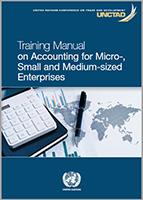Training Manual on Accounting for Micro, Small and Medium-sized Enterprises

Module 1: Accounting: an introduction
Learning outcomes: At the end of this module, you should have an understanding of:
- What accounting is, and why it is important
- How to prepare a straightforward balance sheet
- How to prepare a simplified income statement
- How to prepare a simplified cash flow statement
- How to enter your transactions on an accounting worksheet
Module 2: The accounting cycle
Learning outcomes: At the end of this module, you should have an understanding of:
- The concepts and definitions which underlie accounting
- How to enter transactions into a ledger and extract a trial balance
- The importance of the trial balance
- How to close the accounting cycle and start a new cycle
- How to account for depreciation
Module 3: The components of financial statements
Learning outcomes: At the end of this module, you should have an understanding of:
- The different types of assets
- The different types of liabilities
- Equity accounts for the different entity forms
- The main accounting operations
- How to account for revenue and inventory
Module 4: Interpretation of financial statements and access to finance
Learning outcomes: At the end of this module, you should have an understanding of:
- The horizontal method of financial analysis
- The vertical method of financial analysis
- The financial ratio method of financial analysis
- The importance of a cash budget
- How to access finance through various options
- The importance of timely and accurate financial statements
- The difference between simple interest and compound interest
Training Manual on Accounting for Micro, Small and Medium-sized Enterprises (UNCTAD/DIAE/INF/2021/6)
16 Nov 2021
21 Nov 2021


